The Cover-Up Continues: The Truth About Bill Gates, Microsoft, and Jeffrey Epstein
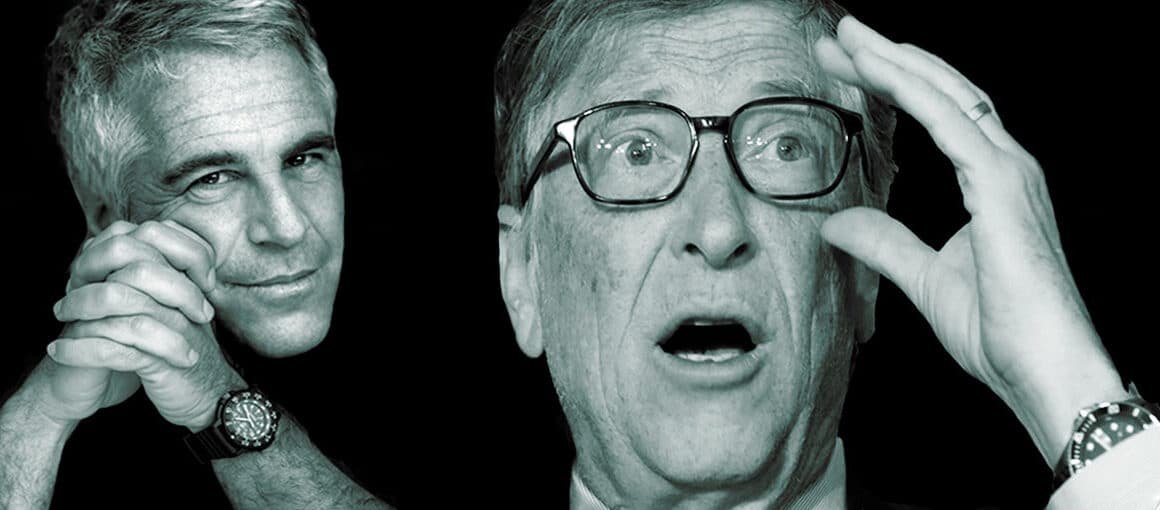
In early May, the announcement that Bill and Melinda Gates would be divorcing after twenty-seven years of marriage shocked both those that praise and those that loathe the “philanthropic” power couple.
Less than a week after the initial announcement of the divorce, on May 7, the Daily Beast reported that Melinda Gates had allegedly been “deeply troubled” by Bill Gates’s relationship with child sex trafficker and intelligence asset Jeffrey Epstein. The report suggested that Melinda was a major reason for her husband’s decision to distance himself from Epstein around 2014 because of her discomfort with Epstein after they both met him in 2013. That previously unreported meeting had taken place at Epstein’s mansion on New York’s Upper East Side.
The Daily Beast also revealed that the details of the Gates’s divorce had been decided several weeks prior to the official announcement. Then, on May 9, the Wall Street Journal published a report suggesting that the plans for divorce went back even farther, with Melinda having consulted divorce lawyers in 2019. Allegedly, that consultation was made after details of Bill Gates’s relationship with Jeffrey Epstein had gained considerable mainstream media attention, including from the New York Times.
While mainstream media outlets apparently agree that Jeffrey Epstein was a likely factor in the Gates’s recently announced split up, what these same outlets refuse to cover is the real extent of the Bill Gates–Jeffrey Epstein relationship. Indeed, the mainstream narrative holds that Gates’s ties to Epstein began in 2011, despite the evidence pointing to their relationship beginning decades earlier.
This blanket refusal to honestly report on the Gates-Epstein ties likely is due to Gates’s outsized role in current events, both in terms of global health policy as it relates to COVID-19 and in his being a major promoter and funder of controversial technocratic “solutions” to a slew of societal problems. What is more likely, however, is that the nature of the relationship between Gates and Epstein before 2011 is even more scandalous than what transpired later, and it may have major implications not just for Gates but for Microsoft as a company and for some of its former top executives.
This particular cover-up is part of an obvious tendency of mainstream media to ignore the clear influence that both Epstein and members of the Maxwell family wielded—and, arguably, continue to wield—in Silicon Valley. Indeed, the individuals who founded tech giants such as Google, LinkedIn, Facebook, Microsoft, Tesla, and Amazon all have connections with Jeffrey Epstein, some closer than others.
This investigation is adapted from my upcoming book One Nation Under Blackmail, which will be released early next year and will include a more complete investigation into Epstein’s ties to Silicon Valley, scientific academia, and intelligence agencies.
The Evening Standard Mystery
In 2001, perhaps the most important article ever written about Jeffrey Epstein was published. The article, which focused mainly on Ghislaine Maxwell’s and Epstein’s relationship with Prince Andrew, was published on January 22, 2001, in London’s Evening Standard. The article, written by Nigel Rosser, was never retracted and was published well before Epstein’s first arrest and the onset of his public notoriety. It has, nevertheless, since been removed from the Evening Standard’s website and can now only be found on professional newspaper databases. I made a PDF of that article and several other scrubbed Epstein-related articles publicly available in October 2019.
Key statements made in the article make it clear why it was removed from the internet, apparently in the wake of Epstein’s first arrest in Florida. Rosser introduces Epstein as “an immensely powerful New York property developer and financier,” a nod to Epstein’s past in the New York real estate market. Later in the article, he notes that Epstein “once claimed to have worked for the CIA although he now denies it,” one of several likely reasons why the article was removed from the internet well before Epstein’s second arrest in 2019.
Much of the article notes the closeness of Epstein and Maxwell to Prince Andrew and suggests that both wielded considerable influence over the prince, largely due to Maxwell’s role as his “social fixer.” It states that Maxwell was “manipulating” the prince and that “the whole Andrew thing is probably being done for Epstein.”
One line stands out, however, as the first major clue toward demystifying the true origin the of the Gates-Epstein relationship. Soon after Rosser introduces Epstein in the article, he states that Epstein “has made many millions out of his business links with the likes of Bill Gates, Donald Trump and Ohio billionaire Leslie Wexner, whose trust he runs.”
Both Wexner’s and Trump’s relationships with Epstein prior to 2001 are well known and date back to 1985 and 1987, respectively. Mainstream media, however, continue to report that Gates and Epstein first met in 2011 and have declined to follow the leads laid out by Nigel Rosser. I am personally aware of this withholding of information to a degree as a BBC reporter contacted me in 2019 for details about this 2001 Evening Standard article, which I provided. To date, the BBC has never reported on the contents of that article. Notably, the BBC has received millions in funding for years from the Bill & Melinda Gates Foundation.
Not only was Rosser’s article never retracted, but neither Gates, Trump, nor Wexner disputed the claims made in the article at the time, which was well before Epstein became notorious. In addition, given that Gates is named alongside two known close Epstein associates at the time—Donald Trump and Leslie Wexner—it further suggests that Gates’s ties to Epstein prior to 2001 were considerable enough to warrant his mention alongside these two other men.
In addition to the Evening Standard article, there is evidence from Maria Farmer, an Epstein victim who was employed by Epstein and Maxwell from 1995 to 1996, that she recalled hearing Epstein mention Bill Gates in such a way as to imply they were close friends and which gave her the impression that the Microsoft cofounder might soon be visiting one of Epstein’s residences.
Microsoft, McKinley, and Isabel Maxwell
Beyond these two key pieces of evidence, there is also the fact that, prior to the Evening Standard article, Gates already had a documented connection to a business run by Ghislaine Maxwell’s sisters in which Ghislaine had a financial stake, which may offer a clue as to the nature of the “business links” alluded to by Nigel Rosser. Furthermore, the odd nature of Gates’s relationship with Isabel Maxwell, who has ties to the PROMIS software espionage scandal and to Israeli intelligence, is documented in a 2000 article from the Guardian.
Twin sisters Christine and Isabel Maxwell, along with their husbands at the time, created the McKinley Group in January 1992. Christine and Isabel had both previously worked for the front company Information on Demand used by their father Robert Maxwell to sell the backdoored PROMIS software to the US government. After Robert Maxwell’s death, Christine and Isabel “wanted to circle the wagons and rebuild” and saw McKinley as “a chance to recreate a bit of their father’s legacy.”
The McKinley Group, however, was not just a venture of Isabel, Christine, and their husbands, as Ghislaine Maxwell also had “a substantial interest” in the company, according to a Sunday Times article published in November 2000. That same article also noted that Ghislaine, throughout the 1990s, had “been discreetly building up a business empire as opaque as her father’s” and that “she is secretive to the point of paranoia and her business affairs are deeply mysterious.” She chose to describe “herself as an ‘internet operator’” during this period, even though “her office in Manhattan refuses to confirm even the name or the nature of her business.”
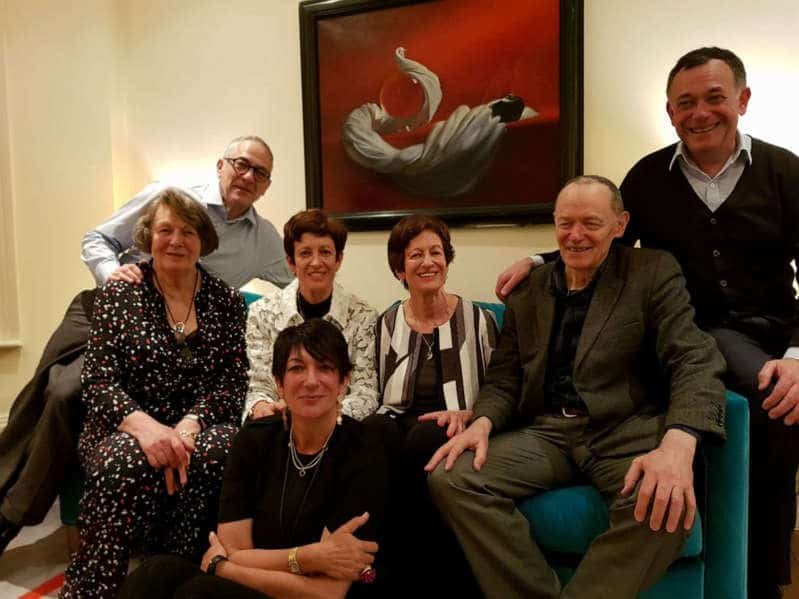
Another article, appearing in The Scotsman from 2001, separately notes that Ghislaine “is extremely secretive about her affairs and describes herself as an internet operator.” It is unclear how involved Ghislaine actually was in the McKinley Group’s affairs. However, during this period, she was operating an intelligence-linked sexual-blackmail operation with Jeffrey Epstein, and there was considerable overlap of their finances, as noted in press reports from the time and afterward.
McKinley created what became known as the Magellan Internet Directory, remembered as “the first site to publish lengthy reviews and ratings of websites.” Magellan’s “value-added content” approach attracted several large corporations, resulting in “major alliances” with AT&T, Time-Warner, IBM, Netcom, and the Microsoft Network (MSN) that were all negotiated by Isabel Maxwell. Microsoft’s major alliance with McKinley came in late 1995, when Microsoft announced that Magellan would power the search option for the company’s MSN service.
McKinley’s fortunes fell, as its effort to become the first search engine to go public failed, igniting a stand-off between Christine Maxwell and Isabel’s then husband that also resulted in the company essentially falling behind other market leaders. As a result, McKinley missed the window for a second IPO attempt and continued to lag behind in adding ad revenue to their business model. Excite, which was later acquired by AskJeeves, ultimately bought the McKinley Group and Magellan for 1.2 million shares of Excite in 1996, which was then valued at $18 million. It was said that it was Isabel Maxwell who made the deal possible, with Excite’s CEO at the time, George Bell, claiming she alone salvaged their purchase of McKinley.
Despite McKinley’s lackluster end, the Maxwell twins and other stakeholders in the company, Ghislaine Maxwell among them, not only obtained a multimillion-dollar payout from the deal but also forged close connections with Silicon Valley high rollers. It is unclear if the money Ghislaine received from the sale was used to further the sexual blackmail operation she was then conducting alongside Jeffrey Epstein.
After the sale of McKinley/Magellan, the overt ties of Christine and Isabel Maxwell to intelligence in both the US and Israel grew considerably. Isabel’s ties to Microsoft also persisted following the sale of the McKinley Group. She became president of the Israeli tech company CommTouch, whose funding was linked to individuals and groups involved in the Jonathan Pollard nuclear spying affair. CommTouch, an “obscure software developer” founded in 1991 by former Israeli military officers, focused on “selling, maintaining and servicing stand-alone email client software products for mainframe and personal computers.” The company specifically courted Isabel because she was the daughter of Israeli “super-spy” Robert Maxwell. Isabel had similar reasons for joining the company, telling Haaretz that leading the company gave her “a chance to continue her father’s involvement in Israel.”
Of all the alliances and partnerships Isabel negotiated during her early years at CommTouch, it was her dealings with Microsoft cofounders Bill Gates and Paul Allen that put CommTouch “on the map.” Microsoft’s cofounders did much more than put CommTouch “on the map,” however, as they essentially intervened to prevent the collapse of its initial public offering, a fate that had befallen Isabel Maxwell’s previous company, the McKinley Group, not long before. Indeed, CommTouch kept pushing back its IPO until a massive investment from firms tied to Microsoft cofounder Paul Allen was announced in July 1999.
The investments from Allen’s Vulcan and Go2Net resulted in a jump in “interest in the stock sale and in CommTouch, until now an obscure software developer,” according to a Bloomberg report, and also inflated their stock price immediately prior to their going public. The money from the Allen-linked companies was specifically used “to expand sales and marketing and build its presence in international markets.” Allen’s decision to invest in CommTouch seems odd from a financial perspective, given that the company had never turned a profit and had over $4 million in losses just the year before. Yet, thanks to Allen’s timely investment and his apparent coordination with the company’s repeated delays of its IPO, CommTouch was valued at over $230 million when it went public, as opposed to a $150 million valuation just weeks before Allen’s investment.
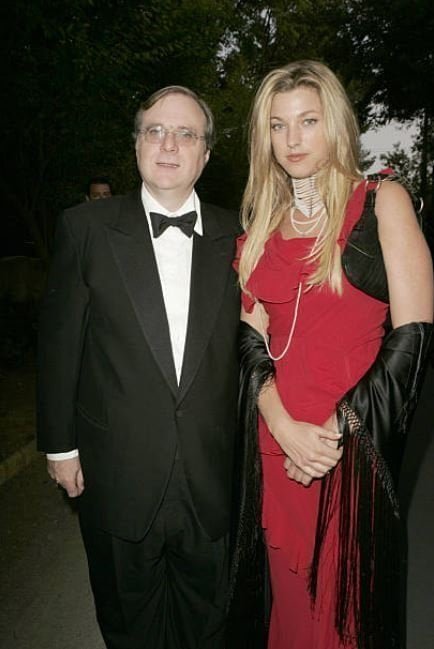
It is not exactly clear why Paul Allen came to the rescue of CommTouch’s IPO and what he expected to gain from his investment. It is worth pointing out, however, that Allen later becameamong the members of an elite online community set up in 2004 called A Small World, whose membership also included Jeffrey Epstein and Epstein-linked figures such as Lynn Forester de Rothschild and Naomi Campbell, as well as Petrina Khashoggi, the daughter of Adnan Khashoggi, a former client of Epstein’s. A Small World’s largest shareholder was Harvey Weinstein, the now-disgraced media mogul who was a business partner of Epstein and who has since been convicted of rape and sexual abuse. Around this same time, Paul Allen was photographed with Epstein associate Nicole Junkermann, herself an intelligence asset.
Less than three months after Allen’s investments in CommTouch in October 1999, the company announced that it had struck a major deal with Microsoft whereby “Microsoft will utilize the CommTouch Custom MailTM service to provide private label web-based email solutions for select MSN partners and international markets.” In addition, per the agreement, “CommTouch will provide MSN Messenger Service and Microsoft Passport to its customers while building upon its Windows NT expertise by supporting future MSN messaging technologies.” “We are looking forward to further enhancing our relationship with Microsoft by integrating other state-of-the-art Microsoft products,” Gideon Mantel of CommTouch said at the time of the deal’s public announcement.
In December 1999, Microsoft announced that it had invested $20 million in CommTouch by purchasing 4.7 percent of its shares. The announcement pushed CommTouch stock prices from $11.63 a share to $49.13 in just a few hours’ time. Part of that deal had been finalized by Richard Sorkin, a recently appointed CommTouch director. Sorkin had just become a multimillionaire following the sale of Zip2, Elon Musk’s first company of which Sorkin had been CEO.
It further appears that Bill Gates, then head of Microsoft, made a personal investment in CommTouch at the behest of Isabel Maxwell. In an October 2000 article published in the Guardian, Isabel “jokes about persuading Bill Gates to make a personal investment” in CommTouch sometime during this period.
The Guardian article then oddly notes, regarding Isabel Maxwell and Bill Gates:
“In a faux southern belle accent, [Isabel] purrs: ‘He’s got to spend $375m a year to keep his tax-free status, why not allow me to help him.’ She explodes with laughter.”
Given that individuals as wealthy as Gates cannot have “tax-free status” and that this article was published soon after the creation of the Bill & Melinda Gates Foundation, Isabel’s statements suggest that it was the Bill & Melinda Gates Foundation Trust, which manages the foundation’s endowment assets, that made this sizable investment in CommTouch.
Furthermore, it is worth highlighting the odd way in which Isabel describes her dealings with Gates (“purring,” speaking in a fake Southern accent), describing her interactions with him in a way not found in any of her numerous other interviews on a wide variety of topics. This odd behavior may be related to Isabel’s previous interactions with Gates and/or the mysterious relationship between Gates and Epstein during this time.
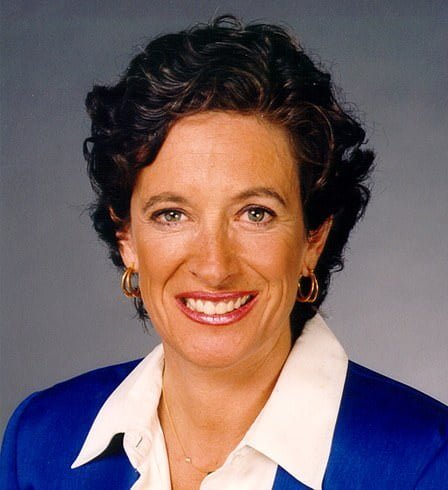
After 2000, CommTouch’s business and clout expanded rapidly, with Isabel Maxwell subsequently crediting investments from Microsoft, led by Gates, and Paul Allen for the company’s good fortune and the success of its effort to enter the US market. Maxwell, as quoted in the 2002 book Fastalliances, states that Microsoft viewed CommTouch as a key “distribution network,” adding that “Microsoft’s investment in us put us on the map. It gave us instant credibility, validated our technology and service in the marketplace.” By this time, Microsoft’s ties to CommTouch had deepened with new partnerships, including CommTouch’s hosting of Microsoft Exchange.
Though Isabel Maxwell was able to secure lucrative investments and alliances for CommTouch and saw its products integrated into key software and hardware components produced and sold by Microsoft and other tech giants, she was unable to improve the company’s dire financial situation, with CommTouch netting a loss of $4.4 million in 1998 and similar losses well into the 2000s, with net losses totalling $24 million in 2000 (just one year after the sizable investments from Microsoft, Paul Allen and Gates). The losses continued even after Isabel formally left the company and became president emeritus in 2001. By 2006, the company was over $170 million in debt. Isabel Maxwell left her position at CommTouch in 2001 but for years retained a sizable amount of CommTouch stock valued at the time at around $9.5 million. Today, Isabel Maxwell is, among other things, a “technology pioneer” of the World Economic Forum.
Epstein, Edge, and Nathan Myhrvold
Another indication of a relationship between Epstein and Gates prior to 2001 is Epstein’s cozy ties with Nathan Myhrvold, who joined Microsoft in the 1980s and became the company’s first chief technology officer in 1996. At the time, Myhrvold was one of Gates’s closest advisers, if not the closest, and cowrote Gates’s 1996 book, The Road Ahead, which sought to explain how emerging technologies would impact life in the years and decades to come.
In December of the same year that he became Microsoft’s CTO, Myhrvold traveled on Epstein’s plane from Kentucky to New Jersey, and then again in January 1997 from New Jersey to Florida. Other passengers accompanying Myhrvold on these flights included Alan Dershowitz and “GM,” presumably Ghislaine Maxwell. It is worth keeping in mind that this is the same period when Gates had a documented relationship with Ghislaine’s sister Isabel.
In addition, in the 1990s, Myhrvold traveled with Epstein in Russia alongside Esther Dyson, a digital technology consultant who has been called “the most influential woman in all the computer world.” She currently has close ties to Google as well as the DNA testing company 23andme and is a member of and agenda contributor to the World Economic Forum. Dyson later stated that the meeting with Epstein had been planned by Myhrvold. The meeting appears to have taken place in 1998, based on information posted on Dyson’s social media accounts. One photo features Dyson and Epstein, with a time stamp indicating April 28, 1998, posing with Pavel Oleynikov, who appears to have been an employee of the Russian Federal Nuclear Center. In that photo, they are standing in front of the house of the late Andrei Sakharov, the Soviet nuclear scientist and dissident, who is alleged to have had ties to US intelligence. Sakharov and his wife, Yelena Bonner, were supporters of Zionist causes.
The photos were taken in Sarov, where the Russian Federal Nuclear Center is based. That same day, another photo was taken that shows Epstein inside a classroom full of teens, apparently also in Sarov, given the time stamp.
Another Dyson image, one without a visible time stamp but with a caption stating the photo was taken “at Microsoft Russia in Moscow” in April 1998, shows Nathan Myhrvold. Dyson’s caption further states, “This was the beginning of a three-week trip during which Nathan and a variety of hangers-on (including a bodyguard) explored the state of post-Soviet science.” Epstein appears to be one of the “hangers-on,” given the photographs, dates, and the described purpose of the trip.
Myhrvold and Epstein apparently had more in common than an interest in Russian scientific advances. When Myhrvold left Microsoft to cofound Intellectual Ventures, Vanity Fair reported that he had received Epstein at the firm’s office with “young girls” in tow who appeared to be “Russian models.” A source close to Myhrvold and cited by Vanity Fair claimed that Myhrvold spoke openly about borrowing Epstein’s jet and staying at his homes in Florida and New York. Vanity Fair also noted that Myhrvold has been accused of having sex with minors provided by Epstein by none other than Harvard law professor Alan Dershowitz, who stands accused of the same crime and who had previously flown with Myhrvold on Epstein’s private plane.
In addition, a former colleague of Myhrvold’s at Microsoft later developed her own ties to Epstein. Linda Stone, who joined Microsoft in 1993 and worked directly under Myhrvold, eventually became a Microsoft vice president. She introduced Epstein to Joi Ito of the MIT Media Lab after Epstein’s first arrest. “He has a tainted past, but Linda assures me that he’s awesome,” Ito later saidin an email to three MIT staffers. In Epstein’s famous little black book, there are several phone numbers for Stone, and her emergency contact is listed as Kelly Bovino, a former model and alleged Epstein coconspirator. After Epstein’s 2019 arrest, it emerged that Epstein had “directed” Bill Gates to donate $2 million to the MIT lab in 2014. Epstein also allegedly secured a $5 million donation from Leon Black for the lab. Ito was forced to resign his post as the lab’s director shortly after Epstein’s 2019 arrest.
Nathan Myhrvold, Linda Stone, Joi Ito, Esther Dyson, and Bill Gates were all members of the Edge Foundation community (edge.org website), alongside several other Silicon Valley icons. Edge, which is described as an exclusive organization of intellectuals “redefining who and what we are,” was created by John Brockman, a self-described “cultural impresario” and noted literary agent. Brockman is best known for his deep ties to the art world in the late 1960s, though lesser known are his various “management consulting” gigs for the Pentagon and White House during that same period. Edge, which the Guardianonce called “the world’s smartest website,” is an exclusive online symposium affiliated with what Brockman calls “the Third Culture.” Epstein appears to have become involved with Brockman as early as 1995, when he helped to finance and rescue a struggling book project that was managed by Brockman.
Edge, however, is more than just a website. For decades, it was also instrumental in bringing together tech executives, scientists who were often Brockman’s clients, and Wall Street financiers through its Millionaires’ Dinner, first held in 1985. In 1999, this event rebranded as the Billionaires’ Dinner, and Epstein became intimately involved in these affairs and the Edge Foundation itself. Epstein was photographed attending several of the dinners as was Sarah Kellen, Ghislaine Maxwell’s chief “assistant” and coconspirator in the Epstein/Maxwell-run sex trafficking and blackmail scheme.
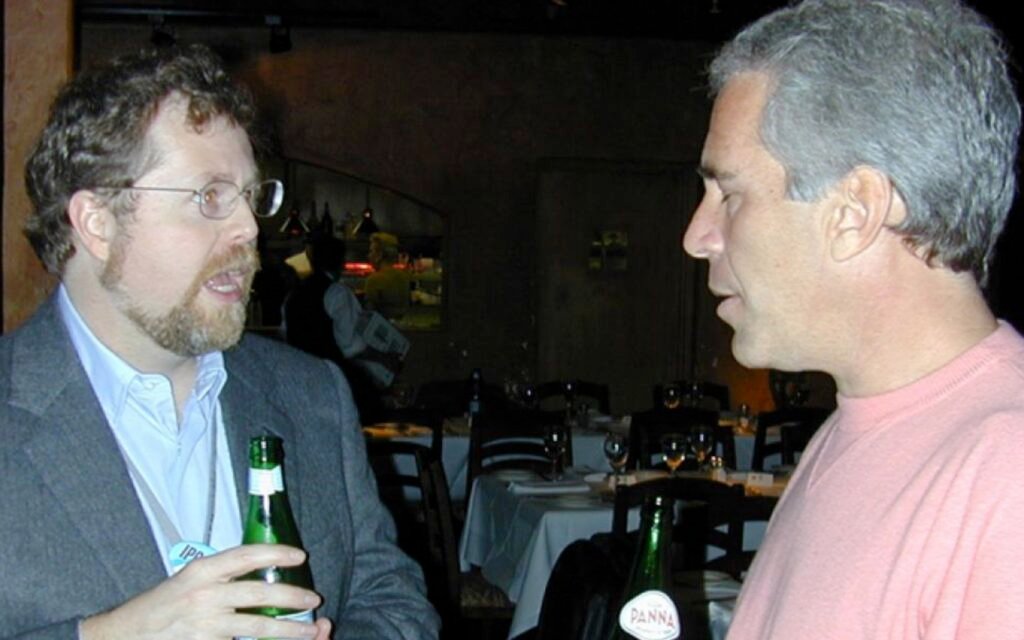
Source: https://www.edge.org/igd/1200
From 2001 to 2017, Epstein funded $638,000 out of a total of $857,000 raised by Edge. During this period, there were several years when Epstein was Edge’s only donor. Epstein stopped giving in 2015, which was incidentally the same year that Edge decided to discontinue its annual Billionaires’ Dinner tradition. In addition, the only award Edge has ever given out, the $100,000 Edge of Computation prize, was awarded in 2005 to Quantum computing pioneer David Deutsch—it was funded entirely by Epstein. A year before he began donating heavily to Edge, Epstein had created the Jeffrey Epstein VI Foundation to “fund and support cutting edge science around the world.”
Since the Epstein scandal, regular attendees of the Billionaires’ Dinner, sometimes called the Edge annual dinner, have referred to the event as an “influence operation.” If one follows the money, it appears it was an influence operation largely benefitting one man, Jeffrey Epstein, and his network. The evidence points toward Myhrvold and Gates as being very much a part of that network, even before Epstein’s involvement in Edge increased significantly.
A Tale of Two Bills
It is worth exploring the ties between the “philanthropic” endeavors of Bill Gates and Bill Clinton in the early 2000s, particularly given Epstein’s and Ghislaine Maxwell’s ties to the Clinton Foundation and the Clinton Global Initiative during that period. According to former Israeli intelligence operative Ari Ben-Menashe, Bill Clinton had been the main focus of Epstein’s sexual blackmail operation in the 1990s, a claim supported by Epstein victim testimony and Epstein’s intimate involvement with individuals who were close to the former president at the time.
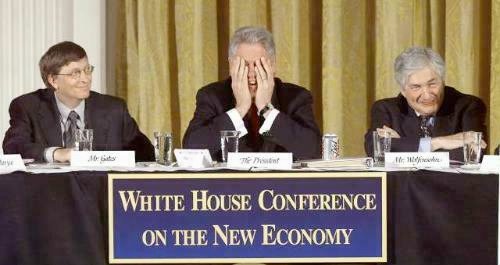
Source: LA Times
Despite tensions arising from the Clinton administration’s pursuit of Microsoft’s monopoly in the late 1990s, the Gates and Clinton relationship had thawed by April 2000, when Gates attended the White House “Conference on the New Economy.” Attendees besides Gates included close Epstein associate Lynn Forester (now Lady de Rothschild) and then secretary of the treasury Larry Summers, who has also come under fire for his Epstein ties. Another attendee was White House chief of staff Thomas “Mack” McLarty, whose special assistant Mark Middleton met with Epstein at least three times at the Clinton White House. Middleton was fired after press reports surfaced detailing his ties to illegal donations linked to foreign governments that had been made to Clinton’s 1996 re-election campaign. Another participant in the conference was Janet Yellen, Biden’s current Secretary of the Treasury.
Gates spoke at a conference panel entitled “Closing the Global Divide: Health, Education and Technology.” He discussed how the mapping of the human genome would result in a new era of technological breakthroughs and discussed the need to offer internet access to everyone to close the digital divide and allow the “new” internet-based economy to take shape. At the time, Gates was backing a company, along with American Telecom billionaire Craig McCaw, that hoped to establish a global internet service provider monopoly through a network of low-orbit satellites. That company, Teledesic, shut down between 2002 and 2003 and is credited as being the inspiration for Elon Musk’s Starlink.
Bill Clinton and Bill Gates entered the world of philanthropy around the same time, with the Bill & Melinda Gates Foundation launching in 2000 and the Clinton Foundation, in 2001. Not only that but Wired described the two foundations as being “at the forefront of a new era in philanthropy, in which decisions—often referred to as investments—are made with the strategic precision demanded of business and government, then painstakingly tracked to gauge their success.”
Other media outlets, however, such as the Huffington Post, challenged that these foundations engaged in “philanthropy” and asserted that calling them such was causing “the rapid deconstruction of the accepted term.” TheHuffington Post further noted that the Clinton Global Initiative (part of the Clinton Foundation), the Gates Foundation, and a few similar organizations “all point in the direction of blurring the boundaries between philanthropy, business and non-profits.” It noted that this model for “philanthropy” has been promoted by the World Economic Forum and the Milken Institute. It is also worth noting that several of Epstein’s own “philanthropic” vehicles were also created just as this new era in philanthropy was beginning.
The Milken Institute was founded by Michael Milken, the notorious Wall Street “junk bond king,” who was indicted on 98 counts of racketeering and securities fraud in 1989. He served little prison time and was ultimately pardoned byDonald Trump. Milken committed his crimes while working alongside Leon Black and Ron Perelman at Drexel Burnham Lambert before its scandalous collapse. Black was deeply tied to Epstein, even having Epstein manage his personal “philanthropic” foundation for several years, even after Epstein’s first arrest. Perelman was a major Clinton donor whose 1995 fundraiser for the then president was attended by Epstein and whose companies offered jobs to Webster Hubbell and Monica Lewinsky after their respective scandals in the Clinton administration. Like Gates, Milken has transformed his reputation for ruthlessness in the corporate world into one of a “prominent philanthropist.” Much of his “philanthropy” benefits the Israeli military and illegal Israeli settlements in occupied Palestine.
Years after creating their foundations, Gates and Clinton discussed how they have “long bonded over their shared mission” of normalizing this new model of philanthropy. Gates spoke to Wired in 2013 about “their forays into developing regions” and “cites the close partnerships between their organizations.” In that interview, Gates revealed that he had met Clinton before he had become president, stating, “I knew him before he was president, I knew him when he was president, and I know him now that he’s not president.”
Also in that interview, Clinton stated that after he left the White House he sought to focus on two specific things. The first is the Clinton Health Access Initiative (CHAI), which he stated exists “thanks largely to funding from the Gates Foundation,” and the second is the Clinton Global Initiative (CGI), “where I try to build a global network of people to do their own thing.”
The Clinton Health Access Initiative first received an $11 million donation from the Gates Foundation in 2009. Over the last twelve years, the Gates Foundation has donated more than $497 million to CHAI. CHAI was initially founded in 2002 with the mission of tackling HIV/AIDS globally through “strong government relationships” and addressing “market inefficiencies.” The Gates Foundation’s significant donations, however, began not long after CHAI’s expansion into malaria diagnostics and treatments. Notably, in 2011, Tachi Yamada, the former president of the Gates Foundation’s Global Health program, joined CHAI’s board alongside Chelsea Clinton.

Regarding the CGI, Epstein’s defense lawyers argued in court in 2007 that Epstein had been “part of the original group that conceived of the Clinton Global Initiative,” which was first launched in 2005. Epstein’s lawyers described the CGI as a project “bringing together a community of global leaders to devise and implement innovative solutions to some of the world’s most pressing challenges.” The Gates Foundation gave the CGI a total of $2.5 million between 2012 and 2013 in addition to its massive donations to the CHAI and an additional $35 million to the Clinton Foundation itself. In addition to the Gates Foundation donations, Gates’s Microsoft has been intimately involved in other “philanthropic” projects backed by Clinton.
In addition to these ties, Hillary Clinton established a partnership between the Clinton Foundation and the Gates Foundation in 2014 as part of the Clintons’ No Ceilings initiative. That partnership sought to “gather and analyze data about the status of women and girls’ participation around the world” and involved the two foundations working “with leading technology partners to collect these data and compile them.” Months before the partnership was announced, Gates and Epstein met for dinner and discussed the Gates Foundation and philanthropy, according to the New York Times. During Hillary Clinton’s unsuccessful run for president in 2016, both Bill and Melinda Gates were on hershort list as potential options for vice president.
In addition, Epstein attempted to become involved in the Gates Foundation directly, as seen by his efforts to convince the Gates Foundation to partner with JP Morgan on a multibillion-dollar “global health charitable fund” that would have resulted in hefty fees paid out to Epstein, who was very involved with JP Morgan at the time. Though that fund never materialized, Epstein and Gates did discuss Epstein becoming involved in Gates’s philanthropic efforts. Some of these contacts were not reported by the mainstream press until after the Bill and Melinda Gates divorce announcement. Yet, as mentioned, it was known that Epstein had “directed” Gates to donate to at least one organization—$2 million in 2014 to the MIT Media Lab.
Recent revelations about Gates and Epstein meetings that took place between 2013 and 2014 have further underscored the importance Epstein apparently held in the world of billionaire “philanthropy,” with Gates reportedly claiming that Epstein was his “ticket” to winning a Nobel Prize. Norwegian media, however, reported in October 2020 that Gates and Epstein had met the Nobel Committee chair, which failed to make a splash in international media at the time. It is worth asking if Epstein managed to arrange such meetings with other individuals who also coveted Nobel Prizes and if any such individuals later received those prizes. If Epstein had such connections, it is unlikely that he would use them only once in the case of Bill Gates, given the vastness of his network, particularly in the tech and science worlds.
The year 2013 is also when Bill and Melinda Gates together met with Epstein at his New York residence, after which Melinda allegedly began asking her soon-to-be ex-husband to distance himself from Epstein. While the stated reason for this, in the wake of the Gateses’ divorce announcement, was that Melinda was put off by Epstein’s past and his persona, it could potentially be related to other concerns about Melinda’s reputation and that of the foundation that shares her name.
Indeed, 2013 was also the year that the Gates mansion systems engineer, Rick Allen Jones, began to be investigated by Seattle police for his child porn and child rape collection, which contained over six thousand images and videos. Despite the gravity of his crime, when Jones was arrested at the Gates mansion a year later, he was not jailed after his arrest but was merely ordered “to stay away from children,” according to local media reports. From Melinda’s perspective, this scandal, combined with Bill Gates’s growing association with convicted pedophile Jeffrey Epstein may have posed a threat to the Bill & Melinda Gates Foundation’s reputation, well before Epstein’s 2019 arrest.
2013 was also the year that the Maxwells become involved in the Clinton Foundation. That year, Ghislaine Maxwell’s TerraMar Project, which officially supported UN Sustainable Development Goals as they relate the world’s oceans, made a $1.25 million commitment to the Clinton Global Initiative as part of an effort to form a Sustainable Oceans Alliance. TerraMar shut down shortly after Epstein’s 2019 arrest.
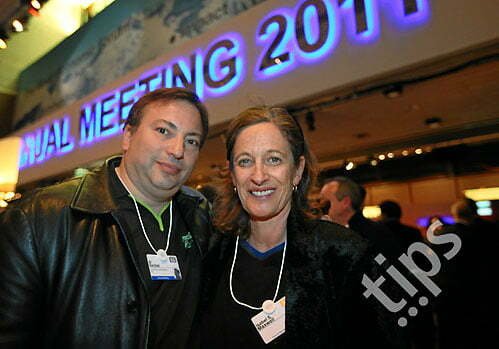
Notably, Ghislaine’s TerraMar Project was in many ways the successor to Isabel Maxwell’s failed Blue World Alliance, which was also ostensibly focused on the world’s oceans. Blue World Alliance was set up by Isabel and her now deceased husband Al Seckel, who had hosted a “scientific conference” on Epstein’s island. The Blue World Alliance also went under the name Globalsolver Foundation, and Xavier Malina, Christine Maxwell’s son, was listed as Globalsolver’s liaison to the Clinton Foundation. He was previously an intern at the Clinton Global Initiative.
Malina later worked in the Obama administration at the Office of White House Personnel. He now works for Google. It is also worth noting that during this same period, Isabel Maxwell’s son, Alexander Djerassi, was chief of staff at the Bureau of Near Eastern Affairs in the Hillary Clinton–run State Department.
Gates Science and Epstein Science
While the Gates Foundation and the Clinton Foundation intermingled, and the latter had ties to Epstein and Maxwell, it also appears that Epstein had significant influence over two of the most prominent science advisers to Bill Gates over the last fifteen years—Melanie Walker and Boris Nikolic.

Source: YouTube
Melanie Walker, now a celebrated neurosurgeon, met Jeffrey Epstein in 1992 soon after she graduated from college, when he offered her a Victoria’s Secret modelling job. Such offers were often made by Epstein and his accomplices when recruiting women into his operation and it is unclear if Walker ever actually worked as a model for the Leslie Wexner-owned company. She then stayed at a New York apartment building associated with Epstein’s trafficking operations during visits to New York, but it is unclear how long she stayed there or at other Epstein-owned properties. After she graduated from medical school in 1998, she became Epstein’s science adviser for at least a year. By 1999, she had grown so close to Prince Andrew that she attended a Windsor Castle birthday celebration hosted by the Queen along with Epstein and Ghislaine Maxwell. During this period, Melanie appears on Epstein’s flight logs under her birth name, Melanie Starnes, though it looks like “Starves” on the flight logs.
The close relationship between Prince Andrew and Melanie Walker came under scrutiny after Epstein’s former housekeeper at the Zorro Ranch property, Deidre Stratton, stated in an interview that Prince Andrew had been “given” a “beautiful young neurosurgeon” while he stayed at Epstein’s New Mexico property. Given that only one neurosurgeon was both close to Prince Andrew and a part of Epstein’s entourage at the time, it seems highly likely that this woman “gifted” to Andrew was Melanie Walker. According to Stratton, Andrew “kept company” with this woman for three days. The arrangement was set up by Epstein, who was not at the property at the time. The exact timing of the stay is uncertain, but it likely took place between 1999 and 2001.
Stratton said the following about the stay:
“At the time, Jeffrey had this, she supposedly was a neurosurgeon, quite young, beautiful, young and brilliant, and she stayed in the home with him… At one point we had all these different teas and you could pick the teas that you wanted and she asked me to find one that would make Andrew more horny.
I’m guessing she understood her job was to entertain him because I guess, the fear, I don’t know; the fear would be that Andrew would say, “No I didn’t really find her that attractive.” . . . He would tell Jeffrey that and then she would be on the ropes.
I’m guessing that, another theory is, that Jeffrey probably had her on retainer and she knew what her job would be, should be, to make these people happy. . . . Sex was all they thought about. I mean, I know for sure that Jeffrey would ideally like three massages a day.”
Sometime later, Walker moved to Seattle and began living with then Microsoft executive Steven Sinofsky, who now serves as a board partner at the venture capital firm Andreesen Horowitz. Andreesen Horowitz notably backs Carbyne911, the Israel intelligence-linked precrime start-up funded by Epstein and his close associate, former prime minister of Israel Ehud Barak, as well as another Israeli intelligence-linked tech company led by Barak, called Toka. Toka recently won contracts with the governments of Moldova, Nigeria, and Ghana through the World Bank, where Melanie Walker is currently a director and a former special adviser to its president. It is unclear when, how and under what circumstances Walker met Sinofsky.
After moving to Seattle to be with Sinofsky and after a brief stint as a “practitioner in the developing world” in China with the World Health Organization, Walker was hired as a senior program officer by the Bill & Melinda Gates Foundation in 2006. Given that the main feature of Walker’s resume at the time was having been a science adviser to another wealthy “philanthropist,” Jeffrey Epstein, her hire by the Gates Foundation for this critical role further underscores how Bill Gates, at the very least, not only knew who Epstein was but knew enough about his scientific interests and investments to want to hire Walker. Walker went on to become deputy director for Global Development as well as a deputy director of Special Initiatives at the foundation. According to the Rockefeller Foundation, where she is a fellow, Walker later advised Gates on issues pertaining to neurotechnology and brain science for Gates’s secretive company bgC3, which Gates originally registered as a think tank under the name Carillon Holdings. According to federal filings, bgC3’s focus areas were“scientific and technological services,” “industrial analysis and research,” and “design and development of computer hardware and software.”
During her time at the Gates Foundation, Walker introduced Boris Nikolic, Gates’s science adviser, to Epstein. Today, Melanie Walker is the cochair of the World Economic Forum’s Global Future Council on Neurotechnology and Brain Science, having previously been named a WEF Young Global Leader. She also advises the World Health Organization, which is closely linked to Bill Gates’s “philanthropy.”
At the WEF, Walker wrote an article in 2016 entitled “Healthcare in 2030: Goodbye Hospital, Hello Home-spital,” in which she discusses how wearable devices, brain-machine interfaces, and injectable/swallowable robotic “medicines” will be the norm by 2030. Years before COVID-19 and the Great Reset–inspired efforts to change health care in just this way, Walker wrote that while the dystopian scenario she was painting “sounds crazy . . . most of these technologies are either almost ready for prime time, or in development.” Of course, a lot of those technologies took shape thanks to the patronage of her former bosses, Jeffrey Epstein and Bill Gates.
In the case of Boris Nikolic, after being introduced to Epstein through Walker, he attended a 2011 meeting with Gates and Epstein where he was photographed alongside James Staley, then a senior JP Morgan executive, and Larry Summers, former Secretary of the Treasury and a close Epstein associate. Nikolic was chief adviser for science and technology to Bill Gates at the time, advising both the Gates Foundation and bgC3. According to the mainstream narrative, this is supposed to be the first time that Gates and Epstein had ever met. In addition, this may have been when Epstein pitched the joint Gates Foundation–JP Morgan “global health charitable fund.”
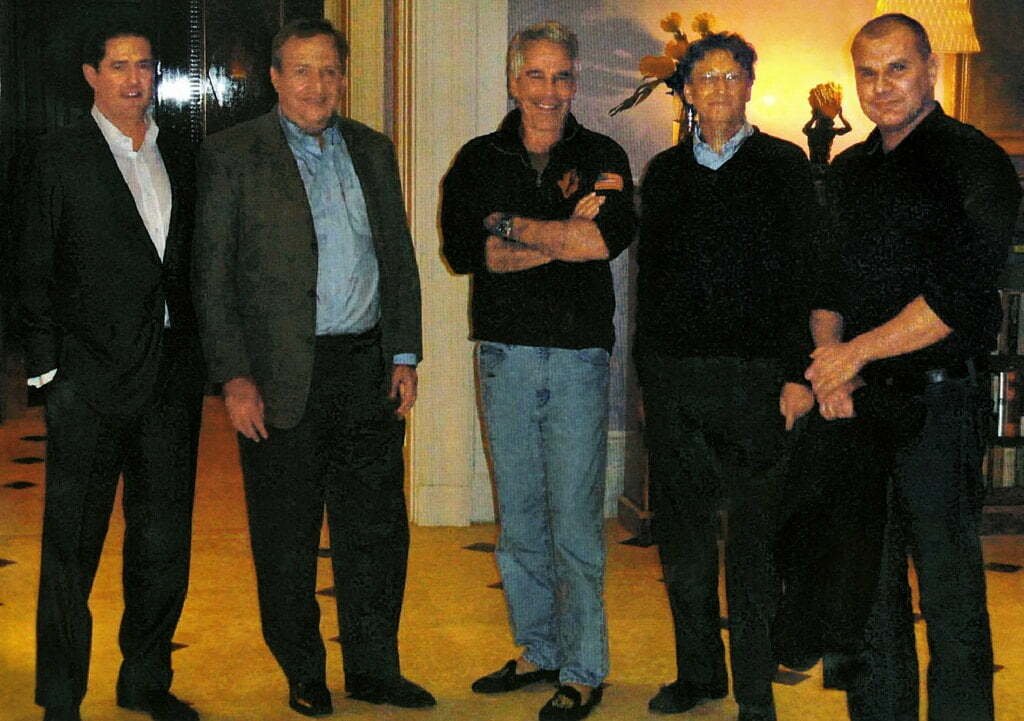
In 2014, Nikolic “waxed enthusiastic” about Epstein’s supposed penchant for financial advice ahead of a public offering for a gene-editing company that Nikolic had a $42 million stake in. Notably, both Nikolic and Epstein were clients of the same group of bankers at JP Morgan, with Bloomberg later reporting that Epstein regularly helped those bankers attract wealthy new clients.
In 2016, Nikolic cofounded Biomatics capital, which invests in health-related companies at “the convergence of genomics and digital data” that are “enabling the development of superior therapeutics, diagnostics and delivery models.” Nikolic founded Biomatics with Julie Sunderland, formerly the director of the Gates Foundation’s Strategic Investment Fund.
At least three of the companies backed by Biomatics—Qihan Biotech, eGenesis, and Editas—were cofounded by George Church, a Harvard geneticist with deep ties to Epstein and also closely associated with the Edge Foundation. Biomatics investment in Qihan Biotech is no longer listed on the Biomatics website. Church’s Qihan Biotech seeks to produce human tissues and organs inside pigs for transplantation into humans, while eGenesis seeks to genetically modify pig organs for use in humans. Editas produces CRISPR gene-editing “medicines” and is also backed by the Gates Foundation as well as Google Ventures.
Church has been accused of promoting eugenics as well as unethical human experimentation. Epstein’s significant interest in eugenics was made public after his death, and Bill Gates, as well as his father William H. Gates II, have also been linked to eugenics movements and ideas.
After Epstein’s death in 2019, it was revealed that Nikolic had been named the “successor executor” of Epstein’s estate, further suggesting close ties to Epstein despite Nikolic’s claims to the contrary. After details of Epstein’s will were made public, Nikolic did not sign a form indicating his willingness to be executor and did not ultimately serve in that role.
The Epstein Cover-Up Continues
Despite the relatively abrupt shift in the mainstream media regarding what is acceptable to discuss regarding the Jeffrey Epstein–Bill Gates relationship, many of these same media outlets refuse to acknowledge much of the information contained in this investigative report. This is particularly true in the case of the Evening Standard article and Bill Gates’s odd relationship with Ghislaine Maxwell’s sister Isabel and CommTouch, the company Isabel previously led.
The likely reason for the continued cover-up of the true extent of Epstein’s ties to Gates has much more to do with Gates’s company Microsoft than with Bill Gates himself. While it is now permissible to report on ties that discredit Gates’s personal reputation, the information that could tie his relationship with Epstein and the Maxwells to Microsoft has been omitted.
If, as the Evening Standard reported, Epstein did make millions out of his business ties with Gates prior to 2001 and if Gates’s ties to Isabel Maxwell and the Israeli espionage–linked company CommTouch were to become public knowledge, the result could easily be a scandal on a par with the PROMIS software affair. Such a disclosure could be very damaging for Microsoft and its partner the World Economic Forum, as Microsoft has become a key player in the WEF’s Fourth Industrial Revolution initiatives that range from digital identity and vaccine passports to efforts to replace human workers with artificial intelligence.
There are clearly powerful actors with a vested interest in keeping the Epstein-Gates narrative squarely focused on 2011 and later—not necessarily to protect Gates but more likely to protect the company itself and other top Microsoft executives who appear to have been compromised by Epstein and others in the same intelligence-linked network.
This is hardly an isolated incident, as similar efforts have been made to cover up (or memory hole) the ties of Epstein and the Maxwells to other prominent Silicon Valley empires, such as those led by Jeff Bezos and Elon Musk. One key reason for this is that the Epstein network’s blackmail operation involved not only sexual blackmail but electronic forms of blackmail, something used to great effect by Robert Maxwell on behalf of Israeli intelligence as part of the PROMIS operation. Given its nature, electronic forms of blackmail through illegal surveillance or backdoored software can be used to compromise those in power with something to hide, but who were uninclined to engage in the exploitation of minors, such as those abused by Epstein.
That Isabel and Christine Maxwell were able to forge close business ties with Microsoft after having been part of the front company that played a central role in PROMIS-related espionage and after explicitly managing their subsequent companies with the admitted intention to “rebuild” their spy father’s work and legacy, strongly points to the probability of at least some Microsoft products having been compromised in some fashion, likely through alliances with Maxwell-run tech companies. The lack of mainstream media concern over the documented ties of the Epstein network to other top Microsoft executives of the past, such as Nathan Myhrvold, Linda Stone, and Steven Sinofsky, makes it clear that, while it may be open season on the relationship between Bill Gates and Epstein, such is not the case for Microsoft and Epstein.
The ties of Epstein and the Maxwells to Silicon Valley, not just to Microsoft, are part of a broader attempt to cover up the strong intelligence component in the origin of Silicon Valley’s most powerful companies. Much effort has been invested in creating a public perception that these companies are strictly private entities despite their deep, long-standing ties to the intelligence agencies and militaries of the United States and Israel. The true breadth of the Epstein scandal will never be covered by mainstream media because so many news outlets are owned by these same Silicon Valley oligarchs or depend on Silicon Valley for online reader engagement.
Perhaps the biggest reason why the military/intelligence origins and links to the current Silicon Valley oligarchy will never be honestly examined, however, is that those very entities are now working with breakneck speed to usher in the Fourth Industrial Revolution, which would make artificial intelligence, automation, mass electronic surveillance, and transhumanism central to human society. One of the architects of this “revolution,” Klaus Schwab, said earlier this year that rebuilding and maintaining trust with the public was critical to that project. However, were the true nature of Silicon Valley, including its significant ties to serial child rapist and sex trafficker Jeffery Epstein and his network, to emerge, the public’s trust would be significantly eroded, thus threatening what the global oligarchy views as a project critical to its survival.
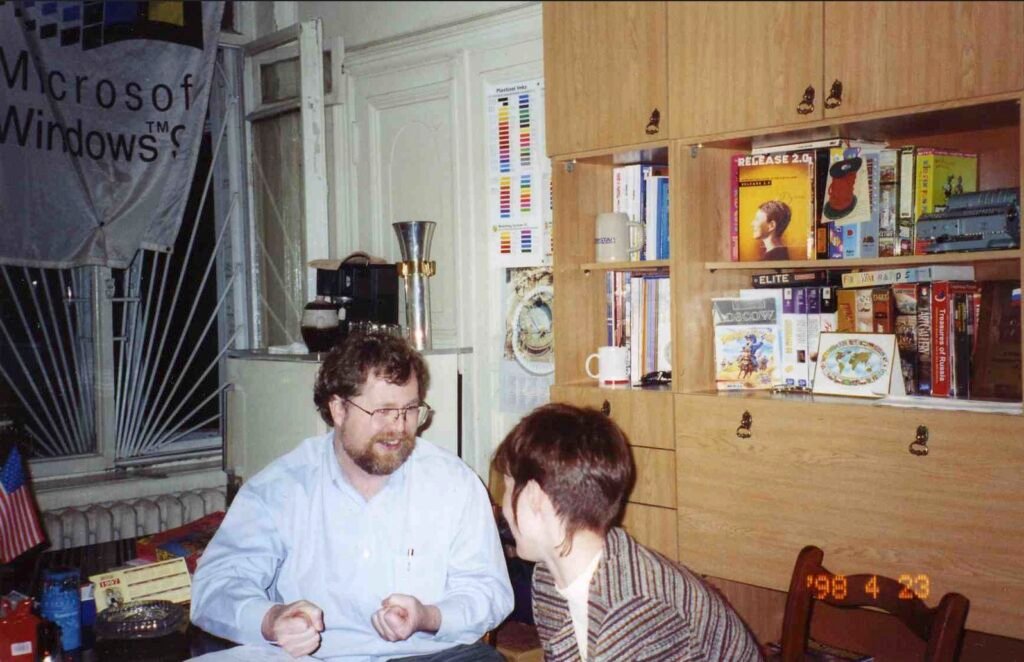







Geen opmerkingen:
Een reactie posten